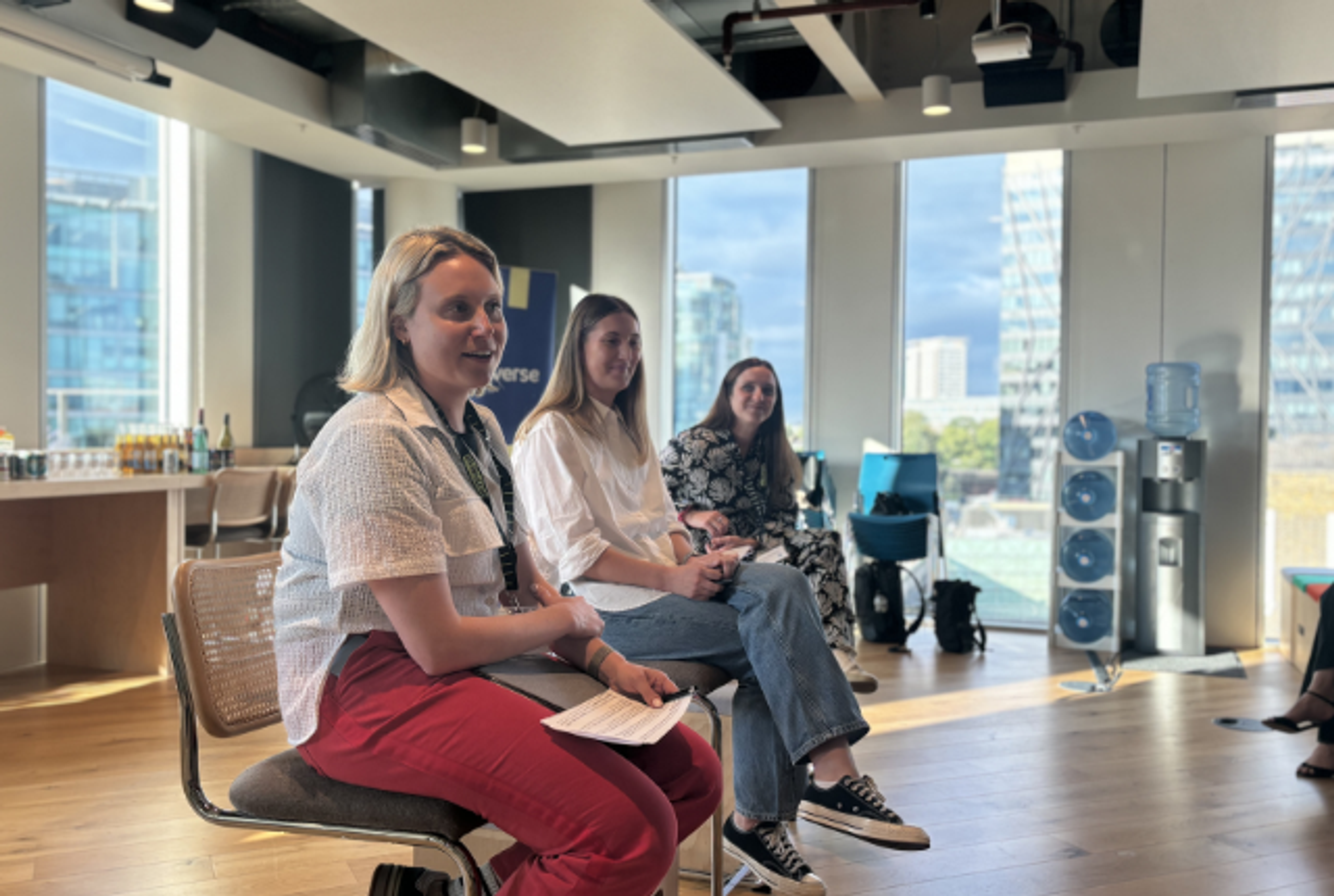Employees are at the heart of workforce transformation. Yet too often, learning and development initiatives emphasise how staff can better serve the business, rather than develop professionally.
77% of business leaders say they plan to increase training and development budgets by 2030, according to Multiverse data. As organisations move to adopt new digital workflows and technologies, they have an opportunity to centre employees in their workforce transformation initiatives.
But what steps can HR leaders take to drive workforce transformation efforts, rather than just execute them?
We recently held a panel discussion at our London headquarters, bringing together HR leaders from multiple industries to discuss how we can put our people at the forefront of workforce transformation initiatives.
The panel was composed of Ioana Nicolae(opens new window), Senior People Specialist at Mastercard, Hayley Crossley(opens new window), Senior People Specialist at Mastercard, and Paige Rinke(opens new window), Multiverse’s VP of People and Talent.

We discussed Mastercard’s innovative approach to career development through the ‘Own Your Career’ programme, and the steps HR leaders can take to drive workforce transformation from the ground up.
These are the five key takeaways from our discussion:
Offer on-the-job learning opportunities
Internal movement can be a valuable tool to connect employee skills to the projects that require them. At Mastercard, there is a culture of internal movement – employees are encouraged to explore other roles and areas of the business where their skills may transfer.
Ioana explained: “Internal movement is a great thing – and I think from a personal perspective, it just helps to see how great it is to have different perspectives of the same thing, and there are transferable skills.”
“From every role that you do, you can learn something new, and you can expand your skill set.”
From this idea came Mastercard’s talent marketplace, an internal platform launched in 2022 to match people and skills to projects within the business. Employees upload their CVs, skill sets and desired skills, then AI matches people to jobs that need resourcing.
Hayley told us: “We saw quite a few projects take off, and in that first six months, we had two people actually change their roles because of it and get a role with their new team. It became really apparent quite quickly that this is a great tool to use for people to test their skill set.”
This style of learning helps Mastercard employees to upskill, share knowledge and contribute to workforce transformation on their own terms – participating in the projects that interest them the most.
“As a manager, even if you were to lose a staff member on your team, but Mastercard keeps them, it’s a win.”
Build tailored learning pathways
Every industry has skills gaps. When addressing those shortfalls, learning and development opportunities should be tailored based on what employees need to succeed in their roles and develop in their careers.
Using data from yearly talent reviews and the talent marketplace, Mastercard provides employees with tailored learning opportunities.
For example, Hayley explained that the team’s AI platform can record employees’ owned and desired skills to set up personalised learning pathways through providers like LinkedIn Learning and Harvard Online Courses.
The tool helps employees identify their skills gaps and assess what their next role or project should be to fill those gaps. It helps to build both technical skills and vital soft skills required in day-to-day work, like communication and change management.
Provide smarter mentorship
Mentorship programmes are a common learning and development tool for businesses – but AI adds an additional layer of value. At Mastercard, mentorship opportunities are intelligently matched according to skill set.
It’s not a system where a more experienced manager will simply mentor a less experienced member of the team. Instead, mentorship takes place across multiple departments and levels of maturity. For example, if an employee tells the system they want to build their communication skills, they could be matched to another employee who possesses these – regardless of their level of seniority.
AI-powered mentorship helps support cross-functional learning and builds relationships across departments, levels of seniority and territories – which is critical for a large, dispersed organisation like Mastercard.
Currently, over two-thirds (69%) of business leaders believe that their organisation will need different workforce skills to stay competitive by 2030. Learning through peer expertise could become increasingly valuable as the workforce looks to expand its digital skills and encourage knowledge sharing between multiple generations of the workforce.
Create a culture of employee learning and development
One of the greatest challenges that HR teams contend with is retention. According to CIPD, the average turnover for UK workers – the proportion of staff who move on to a new employer or are not working after a year from hiring – is 34%(opens new window). It means companies lose talent, and when certain skills are scarce, recruitment can be expensive.
The AI-powered talent marketplace is solving talent retention challenges for Mastercard. The tool helps employees identify, communicate and find opportunities to accelerate their career development, leveraging the resources and budget available to them through initiatives like the Apprenticeship Levy.
A people-first approach to learning and development gives employees autonomy over their career growth, helping them feel supported and more likely to stay with the company. On how Mastercard assesses the value of an opportunity, Hayley said “the one question we ask is, is it going to benefit you in your role?”
Sell workforce transformation projects through your leaders
Equipped with a breadth of workforce data and new AI-powered systems, HR teams are well-positioned to support skills-based workforce transformation. However, business leaders need to be at the forefront of communicating with the organisation and securing buy-in for transformation projects.
When leaders are seen as advocates for learning, and authentically communicate the benefits from the top down, it can help convince decision-makers of the business value of learning and development opportunities.
Ioana highlighted the importance of selling through your leaders. She explained: “If you spend a bit more time with leaders and understand what their challenges are in the business, you have a better idea of how you can match up what they’re missing with what you can add. That’s when they really see the value that HR can bring to the table.”
Since its launch, the talent marketplace has established executive sponsors across the business and engaged staff in transformation initiatives. It has an adoption rate of over 80% within Mastercard, a testament to the success of the project.
Multiverse helps businesses deliver workforce transformation
Upskilling has a central role to play in workforce transformation – and HR professionals are the key facilitators.
Closing the discussion, Paige said, “In the background in HR, we can do the work to help determine skills gaps and what leaders need to be at the forefront of it, but we must make sure that we're really open and honest with the commitment upfront, because it is a commitment, but one that can hopefully be transformational and life-changing.”
The Multiverse team works closely with Mastercard to identify skills gaps and offer upskilling programmes to employees based on their learning and development aspirations.
To learn more about how to align your workforce’s skills with strategic goals, explore Multiverse’s transformation solutions.




